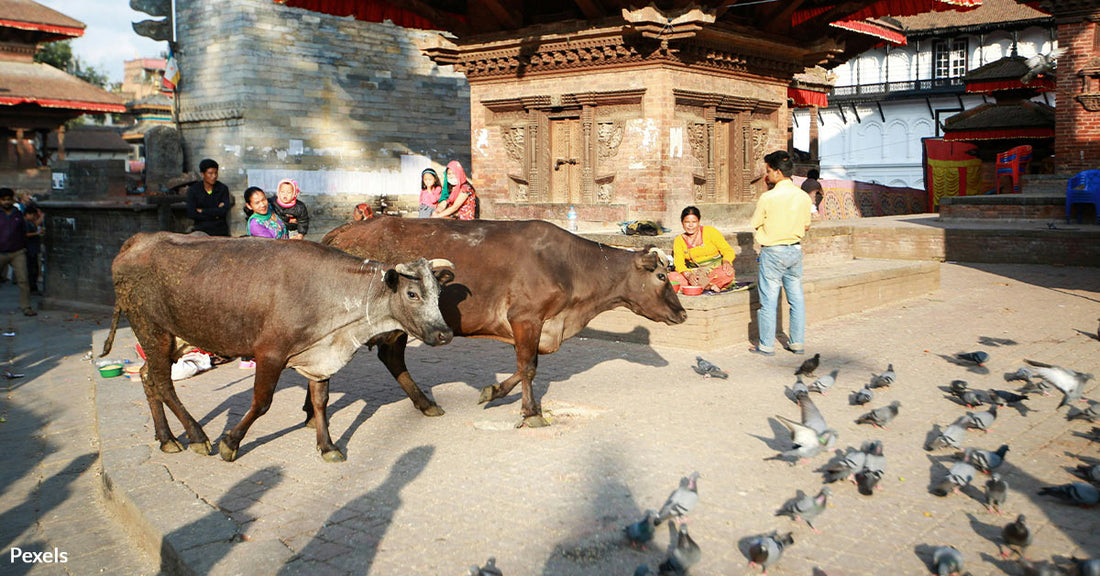Blood-Soaked Tradition Continues as Thousands of Animals Butchered at Nepal’s Gadhimai Festival
Matthew Russell
Photo: Pexels
The Gadhimai Festival in Nepal is the world’s largest mass animal sacrifice event, a tradition that has continued despite widespread international outrage and legal battles.
Held every five years at the Gadhimai Temple in Bariyarpur, southern Nepal, the festival involves the ritual slaughter of tens of thousands of animals, primarily buffaloes, goats, pigs, chickens, and pigeons.
The festival is a religious event in honor of the Hindu goddess of power, Gadhimai, and attracts millions of devotees from Nepal and neighboring India. The origins of the Gadhimai Festival date back around 265 years, when a priest reportedly had a dream in which the goddess Gadhimai demanded a human sacrifice in exchange for freeing him from prison. The priest instead offered an animal, and since then, the tradition of mass animal sacrifice has been upheld every five years at the Gadhimai Temple, The Guardian reports.

The Grim Reality of Gadhimai
The festival’s bloody rituals are a grim sight. Animals are crammed into a small, fenced area with no adequate food or water, awaiting their fate. The festival kicks off with the ceremonial sacrifice of a rat, goat, chicken, pig, and pigeon. Then, around 200 butchers, armed with swords and knives, enter the arena, where thousands of buffaloes and other animals are slaughtered over two days, according to ABC News.
The numbers are staggering. In 2014, approximately 200,000 animals were killed during the festival. The sight of the arena, stained with blood, is haunting. The animals, terrified and in pain, cry out as they are brutally beheaded.
Despite efforts by animal rights activists and court orders to curb the practice, the slaughter continues almost unabated. In 2019, the death toll was somewhat reduced, with an estimated 30,000 to 40,000 animals sacrificed, but the scale of the killing remains vast, BBC News reports.
https://youtu.be/F6pEVBBSGHY?si=KzNjdLRvBT1_hNcG
Legal Battles and Activist Efforts
In 2015, Nepal’s Supreme Court issued a ruling to discourage animal sacrifice during the Gadhimai Festival, directing government bodies to develop a plan to phase out the practice. The ruling came after years of campaigning by animal rights organizations like the Federation of Animal Welfare Nepal (FAWN) and Humane Society International (HSI). These groups argued that the mass slaughter was inhumane and unnecessary, especially in the 21st century.
Despite this ruling, the Gadhimai Temple authorities have been reluctant to fully enforce the ban, claiming that they cannot stop the devotees from offering sacrifices, The Kathmandu Post reports.
The 2019 festival saw a slight reduction in the number of sacrifices, partly due to stricter enforcement by Indian authorities, who seized animals being illegally transported across the border to Nepal, reports Al Jazeera. However, activists argue that much more needs to be done. They point out that while the temple authorities claim to discourage the practice, they have done little to actually prevent the killings.
The festival remains a contentious issue in Nepal, where tradition and religious beliefs often clash with modern views on animal rights.

A Call for Change
The persistence of the Gadhimai Festival in its current form is a stark reminder of the challenges faced by animal rights activists. Despite the reduction in the number of sacrifices and the growing awareness about the cruelty involved, the festival’s organizers and participants remain deeply committed to the tradition.
Many devotees believe that the sacrifices are necessary to appease the goddess and ensure prosperity and protection from evil. Animal rights organizations continue to campaign for a bloodless Gadhimai Festival. As Animal Equality reports, they argue that traditions should evolve and that it is possible to honor religious beliefs without resorting to such extreme cruelty.

The Humane Society International and other groups have called for the Nepalese government to enforce the Supreme Court’s ruling and to work with the temple authorities to develop alternative rituals that do not involve animal sacrifice.
The path to ending the mass slaughter at Gadhimai is fraught with challenges, but activists remain hopeful. Declining numbers of animals being sacrificed are a sign that change is possible. However, until the practice is fully eradicated, the Gadhimai Festival will continue to be a symbol of the ongoing struggle between tradition and the fight for animal rights.
Nepal's Gadhimai Festival is a brutal reminder of the lengths to which some traditions can go in the name of religious devotion. While efforts to reduce the number of sacrifices have made some progress, the sheer scale of the event and the deep-rooted beliefs of its participants mean that the road to a bloodless Gadhimai remains long and arduous.
As activists continue their fight, the world watches, hoping for a future where compassion triumphs over cruelty. Click below to take action for animals and stop this bloody tradition!
Matthew Russell is a West Michigan native and with a background in journalism, data analysis, cartography and design thinking. He likes to learn new things and solve old problems whenever possible, and enjoys bicycling, spending time with his daughters, and coffee.




















